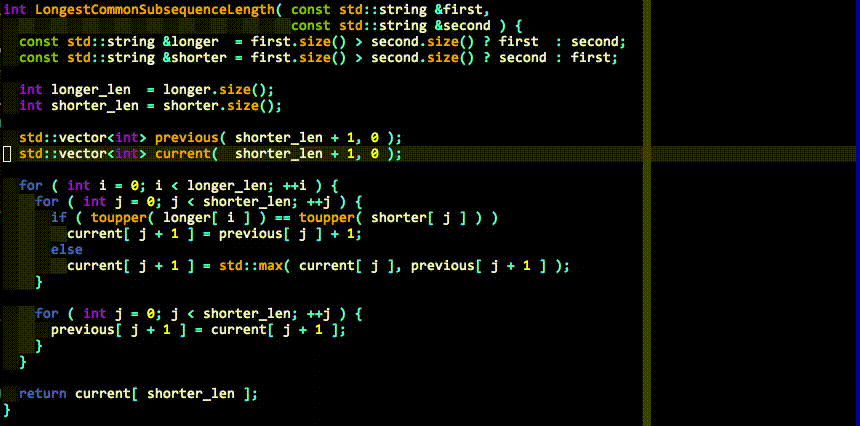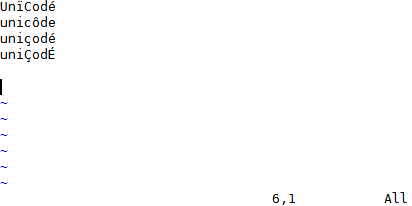YouCompleteMe: a code-completion engine for Vim
===============================================
[](https://gitter.im/Valloric/YouCompleteMe)
[](https://dev.azure.com/YouCompleteMe/YCM/_build?definitionId=3&branchName=master)
[](https://codecov.io/gh/ycm-core/YouCompleteMe)
Help, Advice, Support
---------------------
Looking for help, advice or support? Having problems getting YCM to work?
First carefully read the [installation instructions](#installation) for your OS.
We recommend you use the supplied `install.py` - the "full" installation guide
is for rare, advanced use cases and most users should use `install.py`.
If the server isn't starting and you're getting a "YouCompleteMe unavailable"
error, check the [Troubleshooting][wiki-troubleshooting] guide.
Next check the [User Guide](#user-guide) section on the semantic completer that
you are using. For C/C++/Objective-C/Objective-C++/CUDA, you _must_ read [this
section](#c-family-semantic-completion).
Finally, check the [FAQ][wiki-faq].
If, after reading the installation and user guides, and checking the FAQ, you're
still having trouble, check the [contacts](#contact) section below for how to
get in touch.
Please do **NOT** go to #vim on Freenode for support. Please contact the
YouCompleteMe maintainers directly using the [contact details](#contact) below.
# Vundle
Please note that the below instructions suggest using Vundle. Currently there
are problems with Vundle, so here are some [alternative instructions](https://github.com/ycm-core/YouCompleteMe/issues/4134#issuecomment-1446235584) using Vim packages.
Contents
--------
- [Intro](#intro)
- [Installation](#installation)
- [Requirements](#requirements)
- [macOS](#macos)
- [Linux 64-bit](#linux-64-bit)
- [Windows](#windows)
- [FreeBSD/OpenBSD](#freebsdopenbsd)
- [Full Installation Guide](#full-installation-guide)
- [Quick Feature Summary](#quick-feature-summary)
- [User Guide](#user-guide)
- [General Usage](#general-usage)
- [Client-Server Architecture](#client-server-architecture)
- [Completion String Ranking](#completion-string-ranking)
- [General Semantic Completion](#general-semantic-completion)
- [Signature Help](#signature-help)
- [Semantic Highlighting](#semantic-highlighting)
- [Inlay Hints](#inlay-hints)
- [C-family Semantic Completion](#c-family-semantic-completion)
- [Java Semantic Completion](#java-semantic-completion)
- [C# Semantic Completion](#c-semantic-completion)
- [Python Semantic Completion](#python-semantic-completion)
- [Rust Semantic Completion](#rust-semantic-completion)
- [Go Semantic Completion](#go-semantic-completion)
- [JavaScript and TypeScript Semantic Completion](#javascript-and-typescript-semantic-completion)
- [Semantic Completion for Other Languages](#semantic-completion-for-other-languages)
- [LSP Configuration](#lsp-configuration)
- [Writing New Semantic Completers](#writing-new-semantic-completers)
- [Diagnostic Display](#diagnostic-display)
- [Diagnostic Highlighting Groups](#diagnostic-highlighting-groups)
- [Symbol Search](#symbol-search)
- [Commands](#commands)
- [YcmCompleter subcommands](#ycmcompleter-subcommands)
- [GoTo Commands](#goto-commands)
- [Semantic Information Commands](#semantic-information-commands)
- [Refactoring Commands](#refactoring-commands)
- [Miscellaneous Commands](#miscellaneous-commands)
- [Functions](#functions)
- [Autocommands](#autocommands)
- [Options](#options)
- [FAQ](#faq)
- [Contributor Code of Conduct](#contributor-code-of-conduct)
- [Contact](#contact)
- [License](#license)
- [Sponsorship](#sponsorship)
Intro
-----
YouCompleteMe is a fast, as-you-type, fuzzy-search code completion,
comprehension and refactoring engine for [Vim][].
It has several completion engines built in and supports any protocol-compliant
Language Server, so can work with practically any language. YouCompleteMe
contains:
- an identifier-based engine that works with every programming language,
- a powerful [clangd][]-based engine that provides native semantic code
completion for C/C++/Objective-C/Objective-C++/CUDA (from now on referred to
as "the C-family languages"),
- a [Jedi][]-based completion engine for Python 2 and 3,
- an [OmniSharp-Roslyn][]-based completion engine for C#,
- a [Gopls][]-based completion engine for Go,
- a [TSServer][]-based completion engine for JavaScript and TypeScript,
- a [rust-analyzer][]-based completion engine for Rust,
- a [jdt.ls][]-based completion engine for Java.
- a [generic Language Server Protocol implementation for any language](#plugging-an-arbitrary-lsp-server)
- and an omnifunc-based completer that uses data from Vim's omnicomplete system
to provide semantic completions for many other languages (Ruby, PHP etc.).

Here's an explanation of what happens in the last GIF demo above.
First, realize that **no keyboard shortcuts had to be pressed** to get the list
of completion candidates at any point in the demo. The user just types and the
suggestions pop up by themselves. If the user doesn't find the completion
suggestions relevant and/or just wants to type, they can do so; the completion
engine will not interfere.
When the user sees a useful completion string being offered, they press the TAB
key to accept it. This inserts the completion string. Repeated presses of the
TAB key cycle through the offered completions.
If the offered completions are not relevant enough, the user can continue typing
to further filter out unwanted completions.
A critical thing to notice is that the completion **filtering is NOT based on
the input being a string prefix of the completion** (but that works too). The
input needs to be a _[subsequence][] match_ of a completion. This is a fancy way
of saying that any input characters need to be present in a completion string in
the order in which they appear in the input. So `abc` is a subsequence of
`xaybgc`, but not of `xbyxaxxc`. After the filter, a complicated sorting system
ranks the completion strings so that the most relevant ones rise to the top of
the menu (so you usually need to press TAB just once).
**All of the above works with any programming language** because of the
identifier-based completion engine. It collects all of the identifiers in the
current file and other files you visit (and your tags files) and searches them
when you type (identifiers are put into per-filetype groups).
The demo also shows the semantic engine in use. When the user presses `.`, `->`
or `::` while typing in insert mode (for C++; different triggers are used for
other languages), the semantic engine is triggered (it can also be triggered
with a keyboard shortcut; see the rest of the docs).
The last thing that you can see in the demo is YCM's diagnostic display features
(the little red X that shows up in the left gutter; inspired by [Syntastic][])
if you are editing a C-family file. As the completer engine compiles your file
and detects warnings or errors, they will be presented in various ways. You
don't need to save your file or press any keyboard shortcut to trigger this, it
"just happens" in the background.
**And that's not all...**
YCM might be the only Vim completion engine with the correct Unicode support.
Though we do assume UTF-8 everywhere.

YCM also provides [semantic IDE-like features](#quick-feature-summary) in a
number of languages, including:
- displaying signature help (argument
 linux-的.vim文件-旧 (2000个子文件)
linux-的.vim文件-旧 (2000个子文件)  _regex_unicode.c 1.67MB
_regex_unicode.c 1.67MB _regex_unicode.c 1.67MB
_regex_unicode.c 1.67MB _regex.c 807KB
_regex.c 807KB _regex.c 800KB
_regex.c 800KB watchdog_fsevents.c 33KB
watchdog_fsevents.c 33KB whereami.c 13KB
whereami.c 13KB lang_c.c 3KB
lang_c.c 3KB lang_c.c 3KB
lang_c.c 3KB gccgo_c.c 1KB
gccgo_c.c 1KB cpu_gccgo_x86.c 1KB
cpu_gccgo_x86.c 1KB module.c 294B
module.c 294B foo.c 173B
foo.c 173B hello.c 77B
hello.c 77B Character_test.cpp 20KB
Character_test.cpp 20KB TranslationUnit.cpp 19KB
TranslationUnit.cpp 19KB IdentifierCompleter_test.cpp 11KB
IdentifierCompleter_test.cpp 11KB ycm_core.cpp 10KB
ycm_core.cpp 10KB Word.cpp 10KB
Word.cpp 10KB ClangCompleter.cpp 10KB
ClangCompleter.cpp 10KB ClangHelpers.cpp 9KB
ClangHelpers.cpp 9KB Candidate_test.cpp 9KB
Candidate_test.cpp 9KB CompletionData.cpp 9KB
CompletionData.cpp 9KB TranslationUnit_test.cpp 8KB
TranslationUnit_test.cpp 8KB CodePoint_test.cpp 8KB
CodePoint_test.cpp 8KB ClangCompleter_test.cpp 7KB
ClangCompleter_test.cpp 7KB IdentifierDatabase.cpp 6KB
IdentifierDatabase.cpp 6KB Result.cpp 5KB
Result.cpp 5KB TranslationUnitStore.cpp 4KB
TranslationUnitStore.cpp 4KB Candidate.cpp 4KB
Candidate.cpp 4KB PythonSupport.cpp 4KB
PythonSupport.cpp 4KB IdentifierUtils.cpp 4KB
IdentifierUtils.cpp 4KB PythonSupport_bench.cpp 4KB
PythonSupport_bench.cpp 4KB TestUtils.cpp 4KB
TestUtils.cpp 4KB CodePoint.cpp 4KB
CodePoint.cpp 4KB Character.cpp 3KB
Character.cpp 3KB IdentifierUtils_test.cpp 3KB
IdentifierUtils_test.cpp 3KB IdentifierCompleter.cpp 3KB
IdentifierCompleter.cpp 3KB CompilationDatabase.cpp 3KB
CompilationDatabase.cpp 3KB Word_test.cpp 3KB
Word_test.cpp 3KB Normalization_test.cpp 3KB
Normalization_test.cpp 3KB CandidateRepository_test.cpp 2KB
CandidateRepository_test.cpp 2KB ClangUtils.cpp 2KB
ClangUtils.cpp 2KB FixIt_Clang_cpp11.cpp 2KB
FixIt_Clang_cpp11.cpp 2KB IdentifierCompleter_bench.cpp 2KB
IdentifierCompleter_bench.cpp 2KB FixIt_Clang_cpp11.cpp 2KB
FixIt_Clang_cpp11.cpp 2KB CharacterRepository_test.cpp 2KB
CharacterRepository_test.cpp 2KB CodePointRepository_test.cpp 2KB
CodePointRepository_test.cpp 2KB Documentation.cpp 2KB
Documentation.cpp 2KB Utils_test.cpp 1KB
Utils_test.cpp 1KB Utils.cpp 1KB
Utils.cpp 1KB BenchUtils.cpp 1KB
BenchUtils.cpp 1KB Range.cpp 944B
Range.cpp 944B main.cpp 935B
main.cpp 935B main.cpp 925B
main.cpp 925B Repository.cpp 899B
Repository.cpp 899B versioning.cpp 829B
versioning.cpp 829B some_cpp.cpp 757B
some_cpp.cpp 757B main.cpp 443B
main.cpp 443B basic.cpp 430B
basic.cpp 430B main.cpp 273B
main.cpp 273B basic.cpp 269B
basic.cpp 269B virtual.cpp 218B
virtual.cpp 218B goto.cpp 175B
goto.cpp 175B driver_mode_cl.cpp 158B
driver_mode_cl.cpp 158B driver_mode_cl.cpp 158B
driver_mode_cl.cpp 158B driver_mode_cl.cpp 158B
driver_mode_cl.cpp 158B driver_mode_cl.cpp 158B
driver_mode_cl.cpp 158B macro.cpp 131B
macro.cpp 131B basic.cpp 129B
basic.cpp 129B basic.cpp 129B
basic.cpp 129B main.cpp 109B
main.cpp 109B bar.cpp 73B
bar.cpp 73B foo.cpp 73B
foo.cpp 73B test.cpp 58B
test.cpp 58B fixit.cpp 52B
fixit.cpp 52B test.cpp 48B
test.cpp 48B a.cpp 31B
a.cpp 31B include.cpp 11B
include.cpp 11B foo.cpp 4B
foo.cpp 4B main.css 132KB
main.css 132KB style.css 14KB
style.css 14KB styles.css 10KB
styles.css 10KB markdown.css 5KB
markdown.css 5KB github-gist.css 4KB
github-gist.css 4KB color-brewer.css 3KB
color-brewer.css 3KB jquery.treeview.css 3KB
jquery.treeview.css 3KB hybrid.css 3KB
hybrid.css 3KB grayscale.css 3KB
grayscale.css 3KB default.css 3KB
default.css 3KB railscasts.css 3KB
railscasts.css 3KB monokai_sublime.css 2KB
monokai_sublime.css 2KB darkula.css 2KB
darkula.css 2KB dir.css 2KB
dir.css 2KB article.css 2KB
article.css 2KB sunburst.css 2KB
sunburst.css 2KB obsidian.css 2KB
obsidian.css 2KB xcode.css 2KB
xcode.css 2KB arta.css 2KB
arta.css 2KB googlecode.css 2KB
googlecode.css 2KB atelier-savanna.light.css 2KB
atelier-savanna.light.css 2KB
 我的内容管理
展开
我的内容管理
展开
 我的资源
快来上传第一个资源
我的资源
快来上传第一个资源
 我的收益 登录查看自己的收益
我的收益 登录查看自己的收益 我的积分
登录查看自己的积分
我的积分
登录查看自己的积分
 我的C币
登录后查看C币余额
我的C币
登录后查看C币余额
 我的收藏
我的收藏  我的下载
我的下载  下载帮助
下载帮助 
 前往需求广场,查看用户热搜
前往需求广场,查看用户热搜

 信息提交成功
信息提交成功